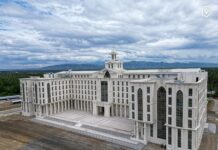THE PHILIPPINES is “in state of calm,” despite fears of a global recession, an official of the National Economic and Development Authority (NEDA) said in a forum at the Civil Law Auditorium last Jan. 27.
“The oil price is going down, the OFW inflows exceeded the targeted growth, and our banks are safe,” NEDA director Dennis Arroyo said in the forum titled “2009 Philippine Macroeconomics Prospects” organized by the Social Research Center.
Arroyo discussed three “economic resiliency” plans to be implemented by the government to ease the effects of the downturn, which include providing livelihood to overseas Filipino (OFW) workers laid off, expansion of programs for the poor, and marketing business outsourcing to the Philippines as a cost-cutting solution for companies in the United States.
He noted that the country was still attracting foreign investors, especially in outsourcing, because of the cheaper cost of Filipino labor.
“We have a lot of employment in call centers. Filipinos are also in demand in terms of health care in the Middle East,” he said.
As part of the economic “stimulus package,” the government plans to build commuter trains in Cavite and Bulacan, expand health insurance coverage, and increase the benefits given by the Government Service Insurance System and the Social Security System.
Tourism is also a bright spot. Arroyo said the country is leading in marine biodiversity, which attracts tourists from Europe and the US “who pay thousands of dollars just to explore the Philippine seas.”
Falling behind
UST economics professor George Garcia said the measures planned by the government are good, but are also “generic and not specific, just like what most Filipinos think.”
“We have so many OFWs because we have no jobs here,” Garcia said. “Do we have specific steps for those who were laid off?”
Despite the potentials of the country, corruption is the reason why the Philippines is still falling behind against neighboring countries like Taiwan, South Korea, China, and Macau, Arroyo said.
“For decades, we have been suffering from graft and corruption. National leadership is the key,” Arroyo said.
Asked how the global recession started, Arroyo pointed to so-called “ninja” loans, where people without income, jobs, and assets were granted housing and consumer loans by US banks.
Arroyo was a visiting fellow at Stanford University last year and was a consultant of World Bank in Washington.















